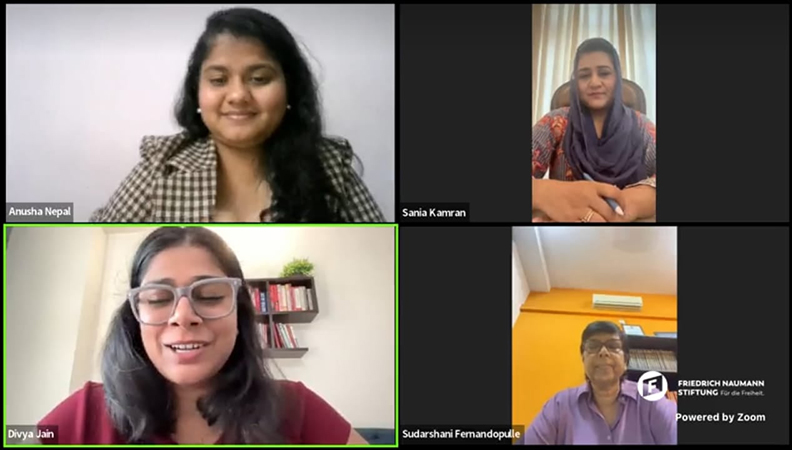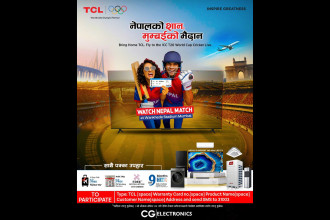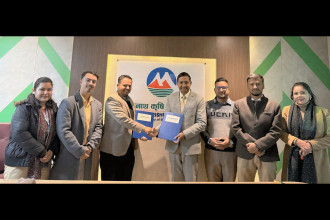
KATHMANDU: The Friedrich Naumann Foundation for Freedom South Asia hosted a webinar titled ‘Empowering Voices: Exploring the Political Landscape for Women in South Asia’ on March 22, in commemoration of International Women's Day. The major objective of the webinar was to foster meaningful dialogue, raise awareness and promote advocacy for gender equality and women's empowerment in the region.
The event started with a brief description about the webinar and the importance of the role of women in political leadership by Yannik Meffert, Desk Officer for International Development Cooperation and Projects in Germany, FNF. He hoped that the insights will inspire more women to voice out their ideas and demand a share in the political discussions in their communities.
During a video message, Annett Witte, Chief Executive Officer, FNF, mentioned that it was very important to empower female leadership in the society. She added there are times when it is difficult for women to find their way in political leadership, and that FNF would do its best to provide more opportunities to female political leadership. In her special remarks, Sandra Weeser MdB, Member of the German Bundestag, stated that it was essential to recognize and support the competence, challenges and achievements of women. She mentioned women are still underrepresented in political decision-making processes and often face discrimination. Thus, it is important to work together to strengthen women's voices and rights and ensure that they can play an equal role in the political arena, she added.
Divya Jain, a seasoned Strategic Advisor and Political Consultant with nearly a decade of experience, was the moderator for the webinar.
The discussions started with panelist Sudarshani Fernandopulle, Member of Parliament of Sri Lanka, speaking about how Sri Lanka elected the first woman to the State Council in 1931 and then the world’s first female prime minister. However, she shared that 90 years down the road a majority of the women in Sri Lankan politics have joined the political sphere because of their family background and connections. She also informed that she entered politics leaving aside her medical practice and this is her third time in parliament. Fernandopulle stated female representation in the Sri Lankan parliament is only 5.3% at present and they are working together across political parties to strengthen this aspect.
She mentioned that along with other members of parliament, they have been working hard to increase female representation at the national level. Fernandopulle stressed that the journey in politics for a woman is quite challenging and moreover they have to compete within their respective parties. She said the other major problem is that election campaigns do require substantial amounts of money.
Speaking on the occasion, panelist Sania Kamran, Former Member of the Provincial Assembly, Pakistan, informed that she had joined politics as a student 12 years back. She reminisced those college days when she was in a dilemma on whether to join the bureaucracy or do her thesis, which would be a bigger platform to bring about a positive change and represent women in Pakistan. She emphasized that being directly involved in drafting legislation is the only way to make women more powerful.
One of the biggest concerns that Kamran has is about the quota for women candidates which is actually filled by women who have political connections within the family. These female representatives are usually nominated by the family members, she said. She further mentioned that power must be delegated to all sectors of the society. Kamran added that women make better ministers because they can multitask. But unfortunately, it is very difficult to convince men in the government that women can be role models, she rued. She said women politicians have been doing their best and a lot of good things are happening in Pakistan but they still have a long way to go.
Meanwhile, Anusha Nepal, Communication Officer, Office of MP Gagan Kumar Thapa, Nepal, shared a memory about the first election she was eligible to vote in and also be part of the election campaign. She had already started working for MP Thapa but one thing she felt really sad about was the fact that there are very few women participating in politics. She also described the moment when a neighbor did not believe and was very skeptical to learn that she was a communication officer for a politician, which goes to show the mentality that people in general have about women being actively involved in politics.
Talking about the younger generation’s participation in politics, Nepal mentioned it solely depends on the people that we are surrounded with. She informed that the younger generation is very active and have more opportunities also because they have had good education and supportive parents. But there are times when it's actually tough, she said when you need to do night shifts too during the elections, so one has to be willing to burn the midnight oil when required.
Adding to the discussions, Kamran highlighted the fact that it was time for people to change their perceptions. She stated that people should not be judging others based on gender – even girls can and have been doing great jobs. Meanwhile, Nepal spoke about how women are given an opportunity to participate in some activities because it is mandatory according to law and not because the concerned people want to see women in those positions. While expressing her opinion on the reservations and quotas for women, Fernandopulle said there are people who are skeptical about whether it will work or not. She added her answer to that is at least it is a start.
While delivering his closing remarks, Dr. Carsten Klein, Head of Friedrich Naumann Foundation for Freedom South Asia, said he personally believes that more women should be brought into politics. He also mentioned that if there were more women in leadership positions in political parties then most probably the world would have been more peaceful.






-1766135582.jpeg)